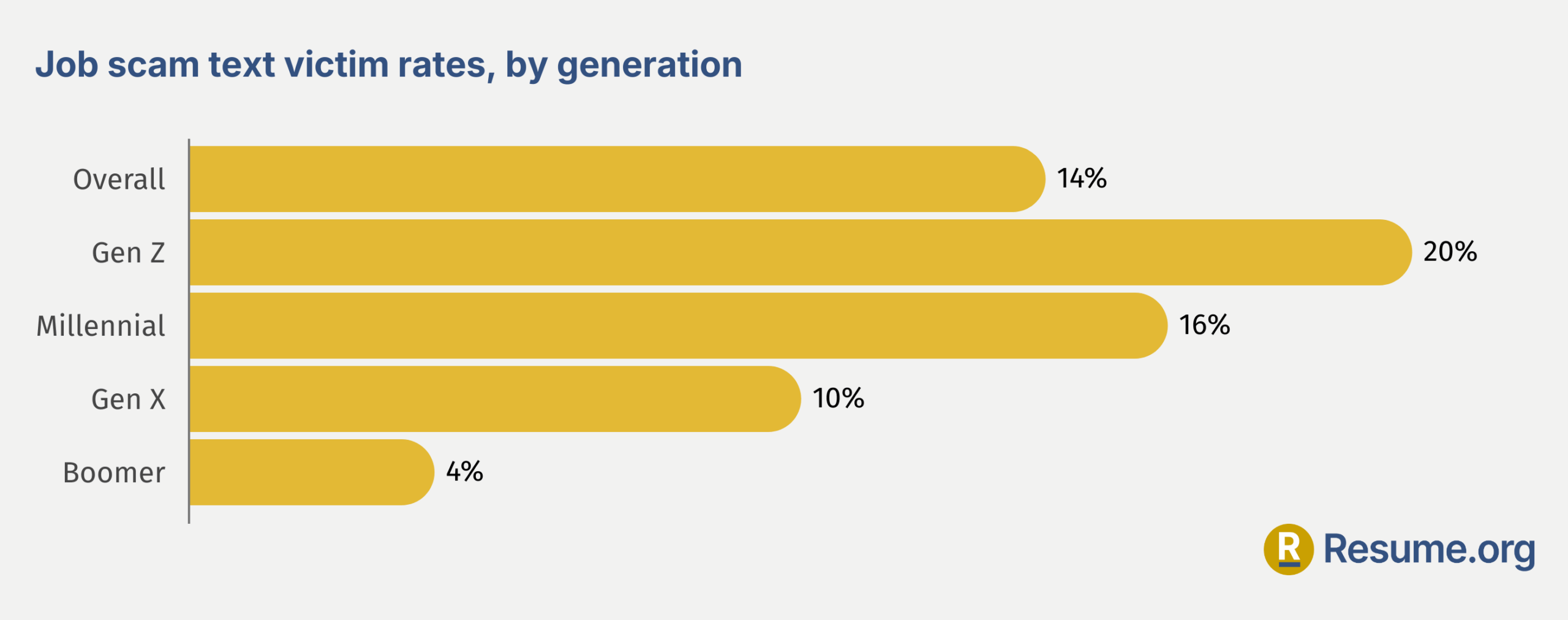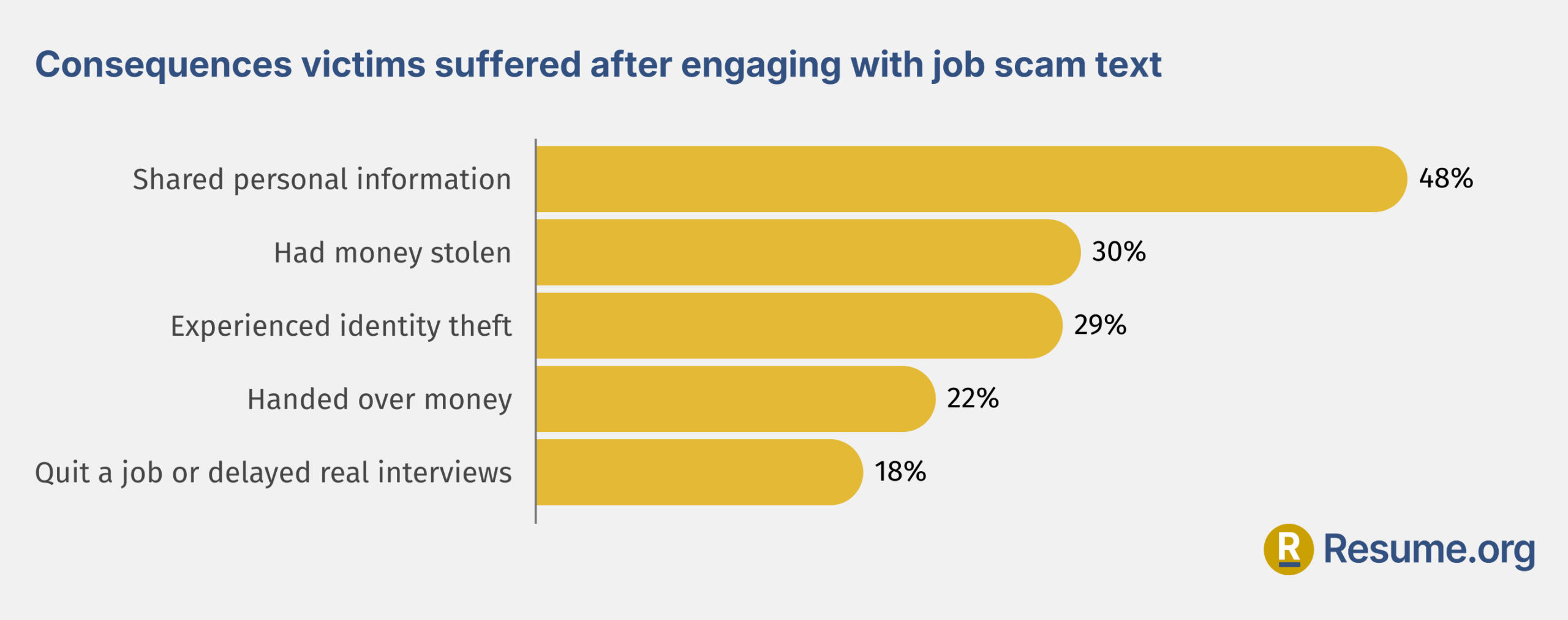A new survey by Resume.org of 2,034 Americans reveals how widespread job scam texts have become in 2025. Nearly two in five Americans say they’ve received a fake job offer via text message this year. While many can easily recognize these types of scams, others aren’t so lucky.
Major takeaways:
- 4 in 10 Americans say they’ve received a job scam text in 2025
- 1 in 7 Americans who received a job scam text say they engaged with it in some way; young men are more likely to fall for these scams
- Scam victims had money stolen from their accounts or sent money directly
- More than half of those who received a scam text say they didn’t report it to anyone
- 8 in 10 say scam texts have made them more cautious about real job opportunities
4 in 10 Americans Received a Job Text Scam This Year
So far in 2025, 39% of Americans say they’ve received a fake job offer via text.
When asked what made the message seem suspicious, most say the fact that it came through a text message instead of a traditional job platform. Others say the job description or company details were vague, the offer seemed too good to be true, or the message included poor grammar and an unprofessional tone. Some say they were tipped off by the fact that they were pressured to respond quickly or promised unrealistic pay.
1 in 7 Fell for the Scam
Most people say they acted quickly to protect themselves. Fifty-nine percent deleted or blocked the number immediately, and another 15% say they simply ignored it.
Others paused to investigate first: 15% researched online to verify whether it was a scam, and 5% asked a friend or family member for input. Additionally, a smaller group engaged more directly: 4% responded to ask for more details, and 1% clicked a link or downloaded something the sender had provided.
Among those who researched the message online or checked with someone they trusted, nearly half engaged further with the scam.
In total, 14% of those who received a job scam text fell victim.
Younger workers are more likely to have fallen victim to the scam. Twenty percent of Gen Zers fell for a job scam, followed by 16% of millennials, 10% of Gen Xers, and just 4% of boomers. Men appear even more likely to become victims, with 24% of Gen Z men and 31% of millennial men interacting with the scam.

“There are several reasons younger people, especially young men, are more vulnerable to job scams,” says Kara Dennison, head of career advising at Resume.org. “Many are early in their careers and haven’t yet developed the instincts to spot red flags. Financial pressure also plays a big role, as the promise of fast, remote income is incredibly appealing when facing student debt and rising living costs.”
She adds that younger professionals tend to be more comfortable with text-based or DM-style communication, so a job offer via text doesn’t raise the same red flags it might for older workers. “There’s often a level of overconfidence, particularly among young men, who may trust their gut and move quickly without verifying, assuming they’ll know a scam when they see one,” Dennison says.
1 in 3 victims had money stolen from them
Of the people who engaged with the job scam text, nearly half, 48%, say they shared personal information with the sender, and 30% had money stolen from their bank account or credit card.
The amount stolen varied: 6% lost less than $100, 32% between $100 and $250, and 38% between $251 and $500. Additionally, 21% report losses of $501 to $1,000, while 3% say scammers took more than $1,000.
Further, 22% of victims gave the scammers money directly. The most common reason was being asked to pay upfront fees, something 84% of victims report. Nearly half, 48%, say they were told to purchase fake equipment, and 40% say they were asked to pay for training. The amounts given also varied: 4% gave less than $100, and 28% between $100 and $250. One-third sent between $251 and $500, and 24% say they lost $501 to $1,000. About 12% sent the scammers more than $1,000.
In addition to financial loss, 29% say they experienced identity theft, and 18% say they quit another job or delayed legitimate interviews because they believed the offer was real.

Many victims were desperate for a job or additional income
When asked why they engaged with the scam, 26% say it seemed like a great opportunity, while 24% say it looked professional and real. Another 21% say they didn’t realize it was fake, 15% say they were desperate for additional money, and 12% say they really needed a job.
“People are falling for job scams because the system is broken. Many are desperate, underpaid, unemployed, or burned out from endless applications, ghosting, and interviews that go nowhere. Scam texts offer what the real job market does not: quick interest, easy money, and validation. On top of that, mass layoffs and return-to-office mandates have left workers feeling disposable. Many are quietly open to other opportunities, even if they do not fully vet them. This is not about naivety. It reflects a lack of trust, transparency, and support in today’s job market,” says Dennison.
8 in 10 Say Scam Text Messages Affected Their Attitude Toward Legitimate Recruiters
These scams are changing how people view the entire job search process. Forty-five percent of respondents say they’re now more skeptical of all recruiter outreach, 44% say they take more time to verify job listings, and 31% say they’ve become hesitant to apply for remote jobs. One in four say they now delay responding to legitimate opportunities.
Despite concerns, most people feel confident in their ability to spot scams going forward. Nearly half (49%) say they are very confident, and 45% say they are somewhat confident. About 6% say they aren’t very confident, and just 1% say they aren’t confident at all.
“Job scams are eroding trust on both sides of the hiring process,” says Dennison. “Candidates are more skeptical of recruiter outreach, especially if it comes through text or LinkedIn. Even legitimate remote jobs are now met with hesitation. Recruiters are spending more time proving they’re real than actually hiring. And for job seekers who have been scammed, the experience can shake their confidence and make the job search feel even more stressful. It adds to burnout and deepens the disconnect between employers and candidates.”
Methodology: Resume.org commissioned this survey, which was conducted via Pollfish in July 2025. A total of 2,034 U.S. residents participated in the survey.
Contact: Kelly Baker – [email protected]
To view all of our other research and studies go to our research page.
Resume.org offers free, HR approved resume templates to help you create a professional resume in minutes. Choose from several template options and even pre-populate a resume from your profile.